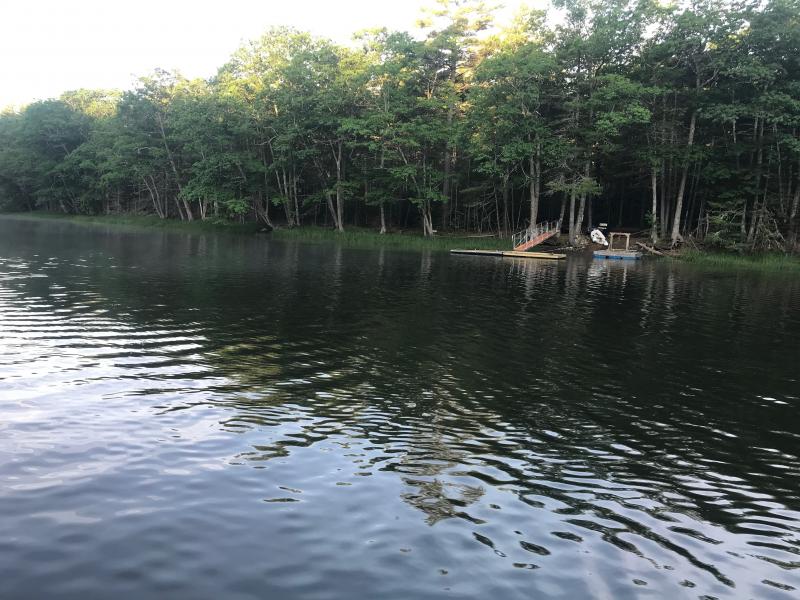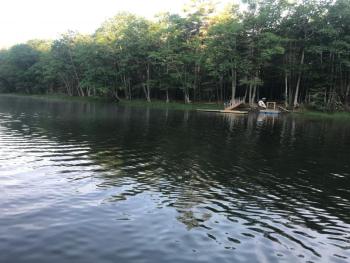About the ramp: Spinney request loses in split vote
Alna planning board’s 2-2 vote on Zoom Monday night sank Jeff Spinney’s request to revamp his ramp on the Sheepscot River. Tom Albee and Acting Chair Taylor McGraw decided the ramp was a legally non-conforming structure grandfathered from the town’s 1993 shoreland zoning rules. Jim Amaral and Laurie Hiestand voted it was not.
Amaral confirmed with town attorney Amanda Meader, a tie means no. Spinney said in a phone interview later, his lawyer Kristin Collins was preparing a response to the board, possibly asking it to reconsider “because (what occurred) clearly is wrong.” He said there were multiple grounds for that and for an appeal, if there is one.
The vote came about an hour into the second night of deliberations. Talks ran three and a half hours June 23.
At the start of night two, Meader announced Collins informed the town over the weekend, Spinney was withdrawing the dock part of his application. That left the ramp. Collins has said Spinney proposed regrading it and bringing in materials to stabilize it. That will help control erosion, Spinney has said.
The board mulled if the ramp pre-dated the ordinance and, if so, did it keep being used or, for lack of use, did the grandfathering lapse.
Amaral said past landowners reported no ramp was used there and that townspeople said there was. But he said none stated the ramp was used after voters adopted the ordinance. And vegetation in a photo he cited also did not indicate a ramp, he said. That is not necessarily a way to tell, according to McGraw. He said most years he is on the river three or four times a week; sometimes grass is visible, sometimes it isn’t, he said.
“There was clearly evidence of gravel on that shoreline,” McGraw said. He said based on the statements the board has received, “I do believe ... the homeowners may not have used (it) but (other) people sure did. It’s pretty clear here from all the people who’ve said they have ...”
Albee said, “The ramp has been there a good number of years.”
Amaral said no evidence was presented of ramp use from the mid-1980s until Spinney bought the property in the early 2000s. “Show me the evidence, because that’s what we have to base a decision on. And it’s Jeffrey’s burden, and I don’t see it.”
Former Lincoln County planner Robert Faunce – in the session for his “expertise,” Meader said – suggested having to show a boat ramp was used is “a pretty tough test” to ask of a landowner. He said showing a commercial structure’s use is a lot easier than for “a pretty primitive structure located far from the residence (and) used at best on occasion over a period of years.”
After the vote, Collins asked if Amaral was chairing the meeting. Amaral called the meeting to order, asked Meader to tell about the development over the weekend, introduced the questions for the board to take up, said that earlier Monday he gathered and circulated to members the public statements the board had received about the ramp; and called for motions, including adjournment. McGraw has been acting chair while Spinney, the board’s chair, recused himself when the board took up the application.
“I was just wondering because (Amaral) sort of served in that role the last two meetings,” Collins told the board. McGraw said Amaral has been a help but was not appointed chair.
In the phone interview after the vote, Spinney said the deliberations had a number of flaws. He said, regardless of how the vote went, the board should have continued through fact-finding steps in case of appeal, and he took issue with Amaral’s circulating of materials before the meeting. That was not all the information the board has received, Spinney added. Watching the deliberations was “terribly frustrating,” he said.
Spinney said anyone he chooses can still use his property. With a town permit he already had, he has replaced the wooden seasonal pier and wooden seasonal ramp system leading to floats, with a seasonal, aluminum ramp from the shore to floats, he said. It is anchored to a granite block onshore, Spinney said.
Resident Cathy Johnson has opposed Spinney’s planning board proposal for several months. She said in a post-meeting phone interview, “The Sheepscot is Alna’s most important natural asset, and I’m really pleased that the planning board, at least some members, carefully applied the shoreland zoning ordinance and concluded that the project was not consistent with (it).” She and others “will certainly be paying attention” to see if Spinney appeals, Johnson said.
Event Date
Address
United States
























